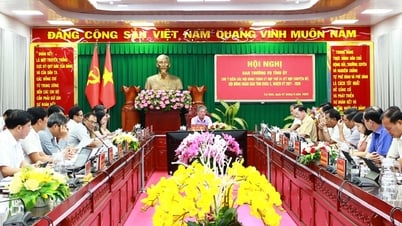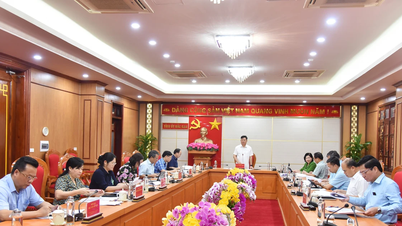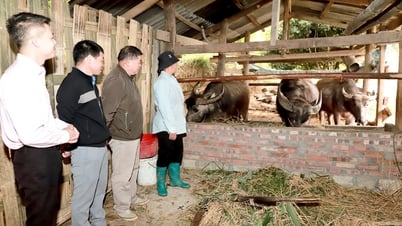
Delegate Phan Thi My Dung contributed to the draft of the revised Law on Notarization.
Deputy Phan Thi My Dung - Director of the Department of Justice of Long An province highly agreed on the necessity of amending the current Notary Law and made contributions to improve regulations related to the organizational model of notary offices, age of notary practice, notary locations and electronic notarization.
First of all , regarding the organizational model of the Notary Office: Delegate Phan Thi My Dung said that the draft law inherits the current regulations, according to which "Notary Offices are organized and operate according to the provisions of this Law and other relevant legal documents for the type of partnership. Notary Offices must have two or more partners and no capital contributors. Partners have equal rights when deciding on matters of the Notary Office". This provision has many advantages such as ensuring the regular and continuous operation of the Notary Office (when the notary is sick or has an accident, illness, etc.) as well as contributing to ensuring the stability and sustainability of the Notary Office to promptly meet the notarization requirements of organizations and individuals.
However, through the practical implementation of the above regulations, some limitations have also been revealed, such as the emergence of a situation where notaries are partners in a formal manner to ensure the operating conditions of the Notary Office (hiring notaries); "Transferring" notaries to meet the conditions to establish a Notary Office. After registering for operation, the partnership membership is terminated, etc. On the other hand, the regulation that a Notary Office must have 2 or more notaries leads to the development of Notary Offices only in densely populated urban areas, areas with strong socio-economic development; it does not encourage the establishment of notary offices in rural areas, remote areas, and even places where there are no notary offices, because the revenue source does not ensure the regular operation of the Notary Office. This makes it difficult for people to access notary services.
To ensure the stable and sustainable development of the notary profession in the spirit of Resolution No. 172/NQ-CP dated November 19, 2020 of the Government on the policy of developing the notary profession, delegate Dung suggested that the draft law should assign the provincial People's Committee to issue a project to manage and develop notary practice organizations in the locality. From there, the locality will consider and decide to allow which localities to develop Notary Offices in the form of private enterprises in accordance with the socio-economic conditions of each place, especially in the context of uneven socio-economic development between localities and regions. At the same time, it will create initiative for localities, contribute to enhancing the responsibility of state management, and ensure that notary practice organizations develop according to approved plans.
In addition, Clause 6, Article 26 of the draft stipulates: “Within 2 years from the date of termination of the partnership membership as prescribed in Points a, b and d, Clause 1 of this Article, a notary who has terminated his partnership membership must still be jointly liable with all his assets for the debts of the Notary Office arising during the time he was a notary partner of that Notary Office; after this period, the notary may participate in establishing a new Notary Office or form a partnership with another Notary Office that is currently operating.” The regulation that a notary is no longer a partner but must still be jointly liable for 2 years is appropriate, I agree, but the regulation that a notary must wait 2 years before participating in establishing a new Notary Office or forming a partnership with another Notary Office is inappropriate, a waste of resources, and is not based on any scientific basis.
At the same time, this provision is also inconsistent with the provisions of the Enterprise Law which do not restrict the right to establish a new enterprise within 2 years after the termination of the partnership. Restricting negative effects when establishing a new notary office requires other appropriate measures and should not seek to bind the right to practice of the notary.
Regarding the transfer of Notary Offices, the draft law stipulates: Notary Offices may be transferred to other notaries who meet the conditions specified in Clause 2 of this Article. Notary Offices may only be transferred when they have been operating as notaries for at least 2 years. Notaries who have transferred their Notary Offices are not allowed to participate in the establishment of new Notary Offices or form partnerships with operating Notary Offices within 2 years from the date of transfer.
According to the delegate, this regulation is inappropriate, specifically when Mr. A established a notary office in Long An, after a period of practice, his family moved or for some reason, he wanted to establish a notary office in Da Nang, his new place of residence, according to this regulation, Mr. A had to transfer the notary office and after 2 years, Mr. A was allowed to establish a notary office in Da Nang, while Mr. A wanted to practice continuously, so he was forced to hire a notary to establish a notary office and Mr. A participated as a contract notary. From there, it created an unhealthy environment, not reflecting the true nature of the establishment and operation of a notary office.
This regulation has also made it so that in the 10 years of implementing the current Notary Law nationwide, there has been no case of transferring a notary office in which the notary chose to withdraw from the partnership, change the name of the notary office, change the name of the head of the notary office, causing unnecessary administrative procedures, while the nature of the case is the same.
Second, regarding the age of notaries: The draft Law supplements the regulations on the age of appointment and practice of notaries to not be over 70 years old (Clause 1, Article 8, Clause 2, Article 14). For practicing notaries who are nearly 70 years old or over 70 years old, the draft Law supplements transitional regulations, according to which notaries who are between 68 and 70 years old at the time this Law comes into effect can practice notary until they are 72 years old; notaries who were appointed before the effective date of this Law and are over 70 years old will have a maximum additional practice period of 2 years. This regulation aims to avoid a sudden decrease in the number of practicing notaries, ensuring a transitional period to appoint notaries to replace the number of notaries who are nearly 70 years old or over 70 years old who have stopped practicing notary.
Delegate Dung agreed to add regulations on the age limit for appointment and practice of notaries. However, the delegate said that the age limit for practice of notaries would not be fair compared to the legal system on the age of practice of other judicial positions such as: Lawyer, Bailiff, Administrator, Auctioneer, etc. Moreover, it would "waste social resources", "restrict the freedom of practice of notaries"... because the majority of notaries in this age group are the first generation of notaries, laying the foundation for the birth of the current notary profession, with a long history of achievements, contributions, and professional experience. It would eliminate the agreement and voluntariness of notaries related to assets, to the transfer of commercial assets that they have built.
In addition, practicing notarization is a very special activity, performing public services authorized by the State, notaries performing notarization play an extremely important role in notarized transactions, requiring notaries to always be clear-headed and clear-headed. Therefore, the delegate proposed that the draft law should stipulate: When a notary is 70 years old or older, he/she must have a health assessment every 6 months and submit it to the Department of Justice where he/she practices. In cases where he/she is not yet at this age and it is deemed necessary, the provincial Department of Justice shall be given the right to request a notary to have a health assessment, enhancing the responsibility of state management in the field of notarization.
Third , on the transfer of authority to authenticate contracts and transactions: Delegates agree with the provisions at Point e, Clause 1, Article 73 of the draft Law on Notarization (amended) on the transfer of authority to the Provincial People's Committee, specifically "Considering and deciding to transfer the authority to authenticate contracts and transactions from the District Justice Department and the Commune People's Committee to notary practice organizations in districts where notary practice organizations have been developed to meet the notarization requirements of individuals and organizations according to the Government's guidance". This provision will contribute to ensuring legal safety for contracts and transactions; at the same time, reducing the workload for local state agencies.
Fourth , regarding the location of notarization: The delegate believes that notarization is a special type of public service, authorized by the state, not a normal type of business service, so to avoid the situation of "notarization on the go" losing the reputation and image of notarization, but at the same time meeting the legitimate needs of the person requesting notarization, in addition to the cases listed for signing outside the headquarters as in the draft, it is necessary to add a comprehensive provision for cases that the draft does not fully anticipate, situations that arise in reality, and for other legitimate reasons (as in current regulations), notarization can be performed outside the headquarters of the notary practice organization.
However, to avoid abuse, the delegate suggested that the bill should be clearly stated in the testimony of the notary and supplement the provision prohibiting the establishment of regular notary transaction points outside the head office without being based on specific notarization requests from customers. At the same time, the Government should specify the signs of illegal notary transaction points and have specific sanctions, strictly handle them.
Fifth , on electronic notarization: Delegates agreed to add provisions on electronic notarization in the draft Law to meet the requirements of the Fourth Industrial Revolution in notarization activities, contributing to promoting digital transformation in civil and economic transactions; ensuring consistency with the new provisions of the Law on Electronic Transactions 2023. However, delegates said that notarization activities must ensure certification of the authenticity and legality of contracts and transactions.
Accordingly, when civil transactions are conducted in the electronic environment, the notarization process also needs to be adjusted to ensure the core elements in the notarization of content, including: (1) Ensuring the authenticity of identity: Correct subject participating in the transaction; (2) Ensuring the authenticity of will: Full civil capacity, voluntary, not forced; (3) Ensuring the will is expressed correctly and fully: Transaction content, signature, confirmation fingerprint; (4) Ensuring that notarized papers and documents are accurately and fully checked; (5) Ensuring the authenticity of the time and place of the transaction; (6) Ensuring that the content of the transaction is legal. At the same time, electronic notarized documents must also meet the requirement (7): Ensuring the integrity and value of evidence in the electronic environment.
In addition, electronic notarization, especially by online electronic notarization, has factors that technology cannot guarantee to completely replace the role of humans such as: Determining the civil capacity of the subject belongs to the rights and responsibilities of the notary, requiring the direct presence of the person requesting notarization in front of the notary. Communication via electronic means is difficult to ensure that the notary can assess the capacity to act and the voluntary will of the person requesting notarization, especially in the current context where high-tech criminals have appeared using AI technology to fake voices and images to commit fraud; Document verification can be replaced by going through a database, but currently the amount of documents that need to be verified is very large and diverse, depending on different types of transactions, requiring a synchronous, complete, and unified database in quantity and quality.
Assessing the legality of transaction content is the main and important task of a notary under the content notarization model, requiring professional capacity and many years of experience of the notary. This issue should be assigned to the Government based on socio-economic conditions to determine the roadmap for implementing electronically notarized transactions and report to the National Assembly Standing Committee for consideration, decision on piloting and implementation.

Deputy Prime Minister, Minister of Justice - Le Thanh Long presented the report on the draft Law on Notarization (amended)
In addition, delegates also contributed issues related to the validity period of the certificate of internship test results; the authority to notarize real estate transactions and proposed considering adding mandatory notarization regulations for enterprise charters, enterprise establishment records and minutes of meetings of the board of directors, general meeting of shareholders, and board of members in enterprises to ensure social order, safety and economic security./.
Kien Quoc
Source























































































![[OCOP REVIEW] Tu Duyen Syrup - The essence of herbs from the mountains and forests of Nhu Thanh](https://vphoto.vietnam.vn/thumb/402x226/vietnam/resource/IMAGE/2025/6/5/58ca32fce4ec44039e444fbfae7e75ec)







Comment (0)